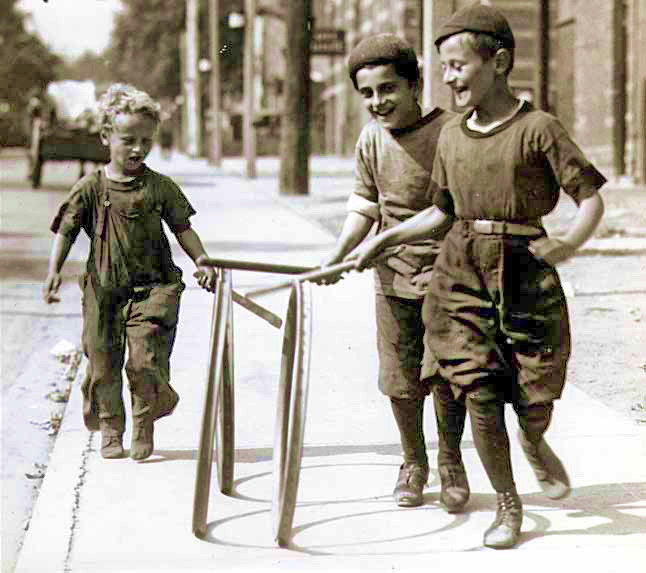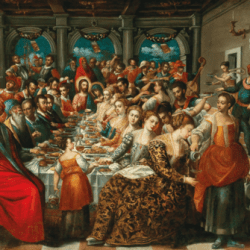The National Review has a snippet-article about “Recess Consultants” whose job is to improve the playtime experience for school children. Circulating elsewhere are reports of schools banning games of Tag, latest casualty in the war on scraped knees and egos. Before we get too wrapped up in our self-righteous huffing and puffing, let’s talk about Don Bosco.
The background is this: St. John Bosco started schools for boys from the bad parts of town. Boys who weren’t growing up in loving homes with attentive parents and supportive communities and wholesome educational opportunities. Boys whose lives are lived along the same lines as many children in the United States experience today.
We imagine that because contemporary Americans, even the poor ones, are far wealthier than destitute late 19th century inner-city Italians, that somehow we’ve got it all together. But look inside the family lives of children today, whether they’re squeaking by on an overworked single-parent’s income or they’re lolling about their mansion unsupervised, wondering when Mom or Dad might fly home, and the picture is eerily similar. Many children are essentially growing up without parents.
So when we think about what might be the best way to educate children, Don Bosco’s advice is far more apt than anything we remember from more recent decades, when most children lived at home with two parents, married to each other, who sat down every evening for dinner together.
So what does the patron saint of under-parented children have to say? That they need an adult to show up, and love them, and live with them:
“As I looked I saw that there were very few priests and clerics mixing with the boys and fewer still taking part in their games: the superiors were no longer the heart and soul of the recreation; most of them were walking up and down by themselves conversing together and paying little attention to what the boys were doing; others were looking on at the recreation but with no real concern for the boys; others watched from a distance with never a word to those at fault; some did warn the boys but rarely and when they did so it was in a threatening manner . . .”
“It was then that my friend went on: ‘In the old days at the Oratory you were always among the boys, weren’t you, especially during the recreation? Do you remember those marvellous years?’ . . .”
“If you want to see everyone of one heart and one mind again, then, for the love of God, you must break down the fatal barrier of distrust and put a happy spirit of confidence in its place. . . . By a friendly relationship with the boys, especially in recreation. Affection can’t be shown without this friendly relationship, and unless affection is seen there can be no confidence. He who wants to be loved must first show his own love. Our Lord made himself little with the little ones and bore our infirmities. He is our Master in this matter of the friendly approach. A master who is only seen in the master’s chair is just a master and nothing more, but if he goes into recreation with the boys he becomes their brother. . . .”
Bosco, Don (1884) ‘An exhortation to educators’, Rome, May 10, 1884. Available in the informal education archives:http://www.infed.org/archives/christian_youthwork/
bosco_exhortation_to_educators.htm.
Every Friday my kids go to midday Mass, then meet their friends on the playground afterwards. Lunches are gobbled down, and then a game of Tag gets going. Parents relax and chit-chat, supervising from a distance but mostly letting the kids come up with their own games and their own rules.
This kind of unstructured play is important. The kids are learning to compete, to negotiate, to organize themselves, and to have fun of their own volition. An over-orchestrated life is an unformed life.
But these children come from healthy homes. Not perfect homes, but homes that provide a good solid foundation. They have parents who are involved in their lives, and who role model kindness and justice and fortitude day after day. They have parents who encourage them, and who give them opportunities to succeed at increasingly difficult tasks, so that they grow in their confidence and in an accurate understanding of their own abilities.
Don Bosco’s boys didn’t come from such homes. Adult-involved recreation was the opportunity to provide the informal, individual-focused parenting that can only come from unscripted, loving interaction between grown-up and child. Being involved in the boys’ games made it possible for the instructor to model the negotiations and rule-setting and organizing that the boys were not learning in the streets. Adult-involved recreation was the chance to show how to be a good sport, how to respond to challenges with charity and good courage, how to resolve a conflict without resorting to running or fighting or both.
***
There’s a certain silliness to some of the reports coming out of the public schools today. Should there really be no games with winners and losers? No chance to engage in tests of speed or agility or strategy? Don’t be ridiculous.
But all the same, the crazy solutions are an attempt to address a real and serious problem: Children can’t play well until they’ve been taught. You think it so obvious because you grew up playing with your parents from the moment you were born. You think it obvious because you banter over dinner, and because you’ve refereed Candy Land, and because sometimes late on a summer evening you even play Tag sometimes. You cannot see that you were taught to play, and have taught your children to play, because this teaching is transparent. It’s the thing parents do.
Well, many children in our schools aren’t growing up with parents. Not parents who are present and involved in their lives. The public schools have Lord of the Flies on their hands, and they are wondering what to do. They are wondering how they can better parent these unparented children. The obvious thing would be for recess consultants to read Don Bosco.

Photo: Boys playing with hoops on Chesnut Street, Toronto, Canada, 1922. [Public Domain] via Wikimedia.












